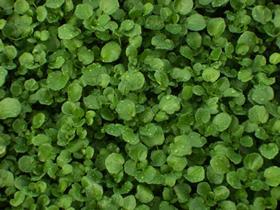
Vitacress has moved to growing salad cress on wood pulp.
The UK's biggest producer of fresh herbs is aiming to offer a sustainable, environmentally-friendly salad cress punnet for its UK retailers and foodservice customers.
Numerous studies undertaken by Vitacress have identified the wood pulp substrate to be the optimum method of crop production.
With a stronger water-holding capacity than previous production methods, the new wood pulp substrate offsets cress dehydration, ensuring a longer and healthier plant life.
Removing peat from salad cress production is an important step forward in the process of completely removing peat from the Vitacress business by the government deadline of 2030.
A spokesperson said: 'The carbon benefits are twofold, firstly the CO2 that was released from collecting peat is avoided and secondly the new substrate requires less transportation, which will reduce lorry loads from 13 to just three per year.
'The chosen substrate is a completely natural material, created by processing of pine trees grown with a sustainable planting system, for every tree harvested during the production, another three trees are planted.
'Scoring high in appearance, texture and overall liking, Leatherhead Food Research found that many consumers regarded the new wood pulp substrate to be environmentally friendly and cleaner within the household.'
Vitacress has been growing UK salad cress for over 40 years, and supplies around 12 million punnets to UK retailers and foodservice customers.
The herbs and salad cress division is based in West Sussex, where it has two nurseries, which have been established since the 1960s when Vitacress first started growing salad crops and began producing fresh herbs in 1989.
Vitacress supplies 12 million punnets of salad cress and over 16 million fresh living potted herbs each year and over 23 million packs of fresh cut and bunched herbs per year.



